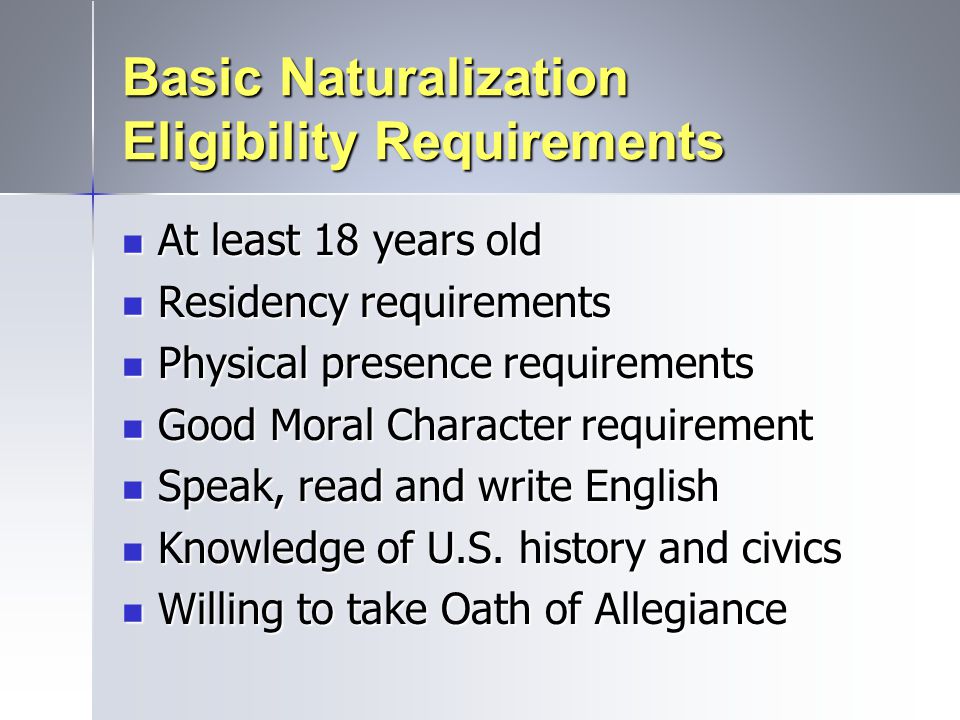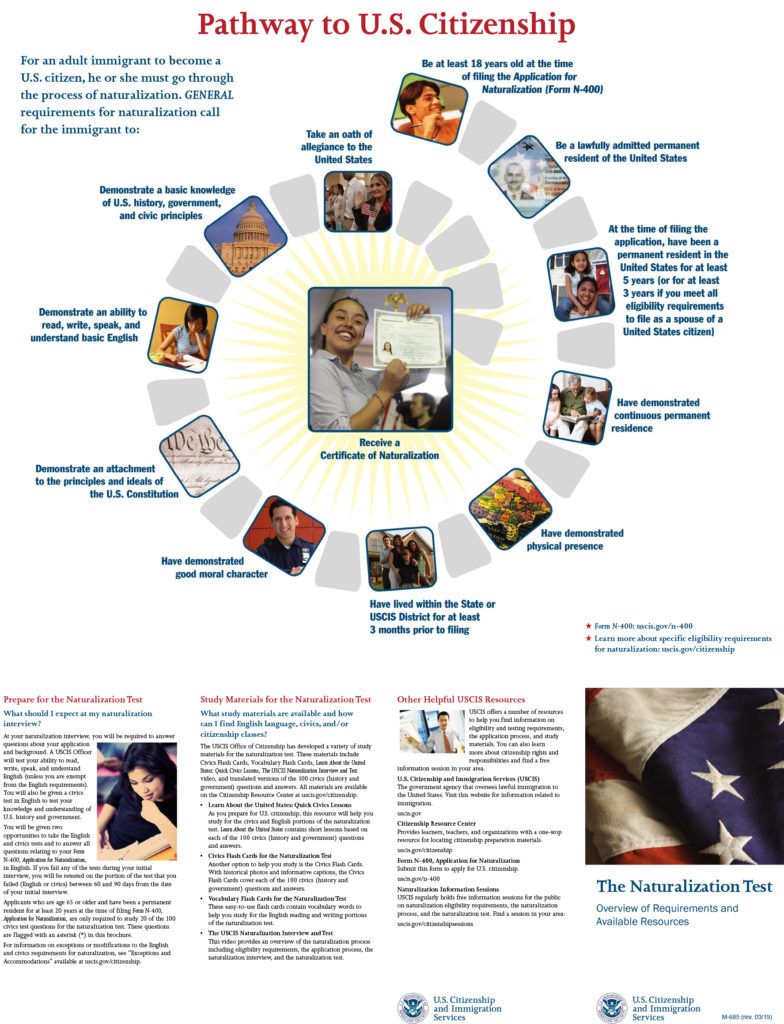Roadmap To Citizenship
APAC’s mission is to cultivate civic engagement to forward the voices of San Diego’s Asian Pacific American community. These voices include those who want to be a part of the American process and become an American citizen.
Th e citizenship process can be intimidating and daunting, so APAC is taking the process and helping people make the path easier to navigate by simplifying the process and making it easier to follow. All of the information, as well as forms, applications, and contacts for more questions, can be found at the U.S. Citizenship and Immigration Services website (https://www.uscis.gov)
e citizenship process can be intimidating and daunting, so APAC is taking the process and helping people make the path easier to navigate by simplifying the process and making it easier to follow. All of the information, as well as forms, applications, and contacts for more questions, can be found at the U.S. Citizenship and Immigration Services website (https://www.uscis.gov)
APAC Presents the Roadmap To Citizenship Workshop series
APAC will be presenting a series of informational and educational workshops beginning in September 2020, covering various topics in regards to becoming a US Citizen.
- Session 1 – Introduction and Overview
- Session 2 – The Process and the Application
- Session 3 – The Interview and Test Preparation
- Session 4 – After Taking the Test and Taking th Oath
- Session 5 – Civic Duty and Engagement
You can register for free for the first session, to take place on September 21, 2020 at the Mira Mesa Senior Center, by clicking on this link – https://roadmaptocitizenship1.eventbrite.com
Find out more information about our Workshop Series by clicking here.
Why should you become a U.S. Citizen?
- Right to Immigrate Family Members
- A U.S. citizen can sponsor a wider number of family members to come to the U.S. and the waiting time for them to receive a visa is faster than for the relatives of permanent residents
- Derivative Citizenship for Children
- When a permanent resident naturalizes, his or her children under age 18 may automatically become U.S. citizens by derivation. (There are certain requirements to qualify for derivative citizenship.)
- Full Civic Participation
- A U.S. citizen has the right to vote in national, state, and local elections; to run for elected office; and to serve on a jury.
- More Employment and Educational Opportunities
- Many federal, state, and local government jobs, as well as certain scholarships for higher education, require U.S. citizenship.
- Travel Benefits
- A U.S. citizen can travel outside the U.S. for unlimited periods of time and re-enter freely.
- Public Benefits
- A U.S. citizen can receive public benefits such as food stamps and Medicaid without the restrictions imposed on non-citizens.
- Protection from Deportation
- A U.S. citizen, unlike a lawful permanent resident, cannot be deported.
What are the Requirements for Citizenship?
- Have had a Permanent Resident (Green) Card for at least five years, or for at least three years if you’re filing as the spouse of a U.S. citizen (see below)
- If you apply for naturalization less than six months before your Permanent Resident Card expires, or do not apply for naturalization until your card has already expired, you must renew your card.
- You can apply for naturalization before you receive your new Green Card, but you’ll need to submit a photocopy of the receipt of your Form I-90, Application to Replace Permanent Resident Card, when you receive it.
- Meet certain eligibility requirements including being
-
- Be at least 18 years old at the time you file Form N-400, Application for Naturalization.
- Be a permanent resident (have a “Green Card”) for at least 5 years.
- Demonstrate continuous residence in the United States for at least 5 years immediately before the date you file Form N-400.
- Show that you have been physically present in the United States for at least 30 months out of the 5 years immediately before the date you file Form N-400.
- Show that you have lived for at least 3 months in the state or USCIS district where you apply. Students may apply for naturalization either where they go to school or where their family lives (if they are still financially dependent on their parents).
- Be a person of good moral character.
- Demonstrate an attachment to the principles and ideals of the U.S. Constitution.
- Be able to read, write, and speak basic English.
- Have a basic understanding of U.S. history and government (civics).
- Take an oath of allegiance to the United States.
- Go through the ten step naturalization process which includes
- Determining your eligibility to become an American citizen
- Preparing and submitting form N-400, the application for naturalization
- Taking the U.S. Naturalization Test and having a personal interview
Click here to learn more details about Form N-400, the Application for Naturalization
What are the Steps to Becoming a U.S. Citizen
- Step 1. Determine if you are already a U.S. citizen.
- Step 2. Determine if you are eligible to become a U.S. citizen.
- Step 3. Prepare your Form N-400, Application for Naturalization.
- Step 4. Submit your Form N-400, Application for Naturalization.
- Step 5. Go to the biometrics appointment, if applicable. Learn more about the biometrics requirements here.
- Step 6. Complete the interview. Click here for Interview and Test Preparation information.
- Step 7. Receive a decision from USCIS on your Application for Naturalization.
- Step 8. Receive a notice to take the Oath of Allegiance.
- Step 9. Take the Oath of Allegiance to the United States.
- Step 10. Understanding U.S. citizenship.
- Citizenship is the common thread that connects all Americans. Check out this list of some of the most important rights and responsibilities that all citizens—both Americans by birth and by choice—should exercise, honor, and respect.
For a much more in-depth and detailed look at each step, click here.
Click here for a printable pdf of the above graphic from the USCIS website
Citizenship Rights and Responsibilities
- Citizenship is the common thread that connects all Americans. We are a nation bound not by race or religion, but by the shared values of freedom, liberty, and equality.
- Throughout our history, the United States has welcomed newcomers from all over the world. The contributions of immigrants have helped shape and define the country we know today. More than 200 years after our founding, naturalized citizens are still an important part of our democracy. By becoming a U.S. citizen, you too will have a voice in how our nation is governed.
- The decision to apply is a significant one. Citizenship offers many benefits and equally important responsibilities. By applying, you are demonstrating your commitment to this country and our form of government.
- Below you will find several rights and responsibilities that all citizens should exercise and respect. Some of these responsibilities are legally required of every citizen, but all are important to ensuring that America remains a free and prosperous nation.
- Rights
- Freedom to express yourself.
- Freedom to worship as you wish.
- Right to a prompt, fair trial by jury.
- Right to vote in elections for public officials.
- Right to apply for federal employment requiring U.S. citizenship.
- Right to run for elected office.
- Freedom to pursue “life, liberty, and the pursuit of happiness.”
- Responsibilities
- Support and defend the Constitution.
- Stay informed of the issues affecting your community.
- Participate in the democratic process.
- Respect and obey federal, state, and local laws.
- Respect the rights, beliefs, and opinions of others.
- Participate in your local community.
- Pay income and other taxes honestly, and on time, to federal, state, and local authorities.
- Serve on a jury when called upon.
- Defend the country if the need should arise.
- After Becoming a U.S. Citizen
More Resources and Information
Click here for information on Interview and Test Preparation
Click here for what to expect After the Test and Interview
Click here for what to do After Becoming a U.S. Citizen
Click here for information on Naturalization for Spouses of U.S. Citizens
Click here for information on Greencard/Permanent Resident Card


